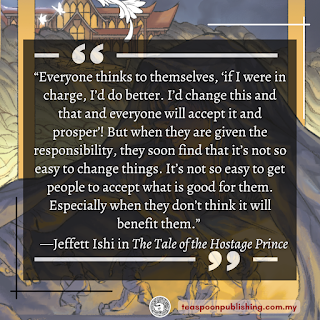Yosua’s story really grew from his relationship with Mikal, so I guess it’s fitting that we dedicate a post to talking about Mikal and Maha.
As stated in Justices, Mind-reading and the Secretkeeper, Terang is made up of three city-states: Maha, Suci, and Impian. And each of these city-states has their own leader and their own magical gifts from Kudus.
Kudus’ gift to Maha is the Amok strength. If you’ve been on this blog long enough, you’ll know that it used to be called the “Berserker” strength. Generally, the concept is the same: in the heat of battle, those possessing this power suddenly find themselves imbued with supernatural strength.
So while Impian is the seat of Justice, Maha is the seat of Power in Terang. (Suci is the seat of Religion, but we’ll bring that up later). Being that I am a firm supporter of separation between state and religion (lol), for all that Terang is a society governed by religious laws, the headship of Terang resides in Maha, with the Sultan of Maha being the Sultan of all Terang as well.
At any rate, I tied in the provision of this strength with some conditions of the Nazarite vows: not cutting their hair, abstaining from alcohol, keeping themselves consecrated to God (or in this context, Kudus). To maintain some form of order or hierarchy (as there should be in military-type endeavours), the tightest binding of the vows is observed by the Sultan of Maha (and the royal sons). From his headship, the Amok strength then flows to all the others with the gift, with the length of their hair signifying their authority and strength.
The Amok Strength, like the Mind-reading powers, manifests around puberty—indicating when a boy had come of age and grown into manhood. Which was why, Mikal, at fifteen, could not become a “man” in Maha, or gain a rank, or be crowned Raja Muda, because of the pesky reason that…he had not yet received the Amok Strength.
Here’s an excerpt of the opening of Amok, to give you a feel of what Mikal is like.
CHAPTER 1 (excerpt)
I wait. Of course I wait.
Just that split second before the fight, waiting for Kudus to come through, to finally grant me His supernatural power, the Amok Strength that’s supposed to run through my veins.
O Kudus, Maha Esa, berkatilah hamba-Mu dengan kuasa ajaib-Mu.
O God Almighty, grant Your servant Your miraculous strength.
I push stray hair out of my face as I wait, hoping for that stirring of power, for that gifting Ayahanda has described in multiple ways time and time again: that surety and Presence, the surge of raw power and rage, sparks running through his limbs.
They say Kudus is never changing. He never disappoints. Well, He doesn’t disappoint. Nothing happens. No power, no presence. Just the continued silence of the past five years, ever since I started silat training at the age of ten.
Tok Yaakub and I circle each other, bare feet stirring up clouds of dust from the packed dirt of the gelanggang. He slashes at me with his keris and I slash back, dancing backwards and forwards to the warm breeze. There’s sweat in my eyes and on my palms, frustration in my soul and in my forms.
This match ends as it always does with his double-edged dagger at my chest. At least this time, I’m not flat on my back. He grunts in disappointment and withdraws his blade. We take a step backwards, bow to each other with our hands clasped in front of our chests, blades facing down. The fight is over and we bear no ill will to each other.
“That was terrible, Putera Mikal,” Tok Yaakub says. “What’s wrong with you today?”
Everything. It’s hot, I’m sticky with sweat, my hair is itchy on my face, I still haven’t earned my Amok Strength, there’s a delegation from Bayangan no one is talking about, rumour says we’re about to go to war, Ayahanda has been distant and busy all week…
“Nothing.” I wipe the sweat off my face with the back of my sleeve. It’s not that I don’t trust him. Besides training me in silat, Tok Yaakub teaches me military tactics and strategies. He’s one of the few adults I trust with my life—but he’s also one of my father’s men and sits on the Majlis as Temenggung, the commander of our military and head of security. Which means I don’t trust him with my secrets.
“Come, let us put away the keris and go hand to hand. Get some of that restless energy out of you.” He wipes down his keris and lays it on the outer edge of the marked circle.
My keris is about the length of my forearm. I take my time to shine each curve of the iron blade before I sheath it, rubbing away my sweat from the carved, gilded hilt. Then I walk to the opposite end of the circle and place it on the stand. I don’t have to. There’s no rule that says I should do so. I retie my knee-long hair into a bun so it will stop flying in my face then adjust my belt for the absence of the keris.
I turn to find Tok Yaakub scrutinising me with a worried look. His hair is neatly tied at the nape and falls down to his waist. I don’t know how he does it. Maybe it’s part of the Amok gift that’s extended from my father the Sultan to him as Temenggung.
“Are you sure you’re not ill?” He crosses the circle towards me and I duck to avoid the arc of his hand that’s trying to feel my forehead.
“I said it’s nothing, Tok Yaakub. I’m not sick.”
He sniffs in disbelief. “It’s never nothing with young men like you. Now either you best me or you tell me what’s bothering you.”
This time I don’t wait. I don’t bother with protocol that says we have to face each other and bow, that courtesy of making sure he’s ready. No one’s going to wait for me to be ready in war. He’s always ready though, he’s always prepared, so I can’t break through his defences, no matter how high or how low I strike, arms, legs or elbows.
We break apart and circle each other again.
“Is Terang at war?” I blurt.
A look of caution enters his face, his eyes wary, searching me. “Where did—what do you mean?”
“Where did I hear that? People talk you know, and sometimes I listen.”
He grimaces and straightens his stance, dropping his hands. “Do you see any armies? Any fighting?”
I haven’t, but Yosua heard it from his father, and Garett’s rumours are always right. It may not be here yet, but it’s coming. I straighten as well, folding my arms. “Why else are the Bayangans here?” I don’t know why I’m saying this—this is Majlis business I’m not supposed to know about—but once I start, there’s no stopping the flow.
“They’re not here for—”
“Ayahanda doesn’t tell me anything. Am I not old enough to be involved in the affairs of the sultanate?”
“Tuanku, your father—”
“I’m next in line to the throne, Tok Yaakub, but I don’t know anything that’s happening in Terang—or even here in Maha! My personal attendant, my servant, knows more than I do!” Yosua has always known more than me through the servant’s gossip, but I don’t say this. I can’t tell Tok Yaakub that almost every bit of news I hear comes from my servant because no one else in the palace tells me anything. “I don’t know what’s going on and the Majlis thinks I’m stupid and naive. They look at me and say I need to be responsible, that I need to act for the best of the sultanate. Then they look down on me because they think I don’t…but the truth is I can’t because I don’t know anything.”
My voice cracks and I wince. My eyes are prickling and my face is hot.
I’m fifteen, not five.
I steel myself and glare at the face of my teacher, who looks bemused. It rankles. I am Mikal ayell Simson, only son of Sultan Simson of Maha, the First City of Terang. I am a prince not some backwater fool or village champion trying to act smart.
###
What is faith, except hope in desperation?
All Putera Mikal wants is to gain the Amok Strength, the supernatural power granted by Kudus to the Mahan royal family. No matter how religiously Mikal keeps his vows, Kudus still denies him the Strength—whilst his father, Sultan Simson, flaunts the Strength despite his blatant defiance of the Temple and the priests’ visions of coming doom.
Then the prophecies come true.
Taken captive, Mikal must find a way to liberate his people and restore his throne in Maha—and the key to this is the Amok Strength. But what does it take to gain Kudus’ favour?
###
Before I end this post, I wanted to crosslink a review of The Tale of the Hostage Prince by Mermaird!
If you have been following my reviews, you may know that Amok (read my review here) is one of my favourite reads of 2021, and it is still among the top of my favourite fantasy reads. As much as I loved the main character, Mikal, his best friend, Yosua had been my favourite character from the start...
The Tale of the Hostage Prince is a fast-paced story that left me breathless; there was no time to rest as things keep getting worse for Yosua after each page. The violence and torture are rather gruesome, perfect for my taste, even if it leaves a bitter aftertaste when I consider that Yosua does not deserve any of it. His faith is questioned and his efforts seem futile, but someone with a big heart like him never gives up. I love how hard he tries his best, and whenever he feels like giving up, somewhere deep inside him knows that it is not the right thing to do. This is why he will always be my favourite ♡
Read the whole review here!
###
Head back to my theme reveal and master list.
Go check out the other A to Z Bloggers!
###
The Tale of the Hostage Prince (Book 1.5)

Yosua wears an uneasy crown. Although he is now Raja of Bayangan, he still
longs for the land of his birth where everything was much simpler…and less
deadly.
But peace doesn’t come easily, not for a twenty-year-old
servant playacting at being king.
With his parents brutally
murdered and his uncle bent on revenge, Yosua must decide where his loyalties
truly lie. With his only remaining relative and the kingdom he has claimed? Or
with his best friend Mikal and the sultanate that raised him as a hostage?
BUY NOW!
 Yosua wears an uneasy crown. Although he is now Raja of Bayangan, he still
longs for the land of his birth where everything was much simpler…and less
deadly.
Yosua wears an uneasy crown. Although he is now Raja of Bayangan, he still
longs for the land of his birth where everything was much simpler…and less
deadly.










